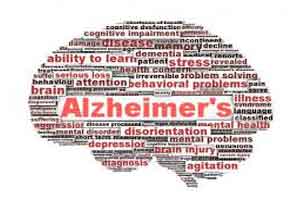- Home
- Editorial
- News
- Practice Guidelines
- Anesthesiology Guidelines
- Cancer Guidelines
- Cardiac Sciences Guidelines
- Critical Care Guidelines
- Dentistry Guidelines
- Dermatology Guidelines
- Diabetes and Endo Guidelines
- Diagnostics Guidelines
- ENT Guidelines
- Featured Practice Guidelines
- Gastroenterology Guidelines
- Geriatrics Guidelines
- Medicine Guidelines
- Nephrology Guidelines
- Neurosciences Guidelines
- Obs and Gynae Guidelines
- Ophthalmology Guidelines
- Orthopaedics Guidelines
- Paediatrics Guidelines
- Psychiatry Guidelines
- Pulmonology Guidelines
- Radiology Guidelines
- Surgery Guidelines
- Urology Guidelines
Alzheimer's can be detected 7 years before symptoms show up: study

London: Researchers have in a breakthrough study found that brains of people genetically inclined towards Alzheimer's are likely to show abnormal immune reactions as early as about seven years before the expected onset of dementia.
These immune responses can be detected by means of a protein known as "TREM2" and found in the cerebrospinal fluid, offering physicians the possibility to trace the progression of the disease, the study said.
Thus, when the researchers measured the levels of TREM2 -- segregated by certain immune cells of the brain called microglia -- they were able to detect an increasing immune activity of the brain.
"The activity of the microglia is stimulated by the dying brain cells, not by the deposits of amyloid proteins, called plaques, which also occur in Alzheimer's disease," said Christian Haass, Professor at Ludwig Maximilian University (LMU) in Munich, Germany.
The rise of TREM2 levels years before the expected occurrence of dementia symptoms can be monitored and thus the timing for the onset of dementia can be precisely predicted, the researchers noted.
"TREM2 levels could therefore be a biomarker used to track immune activity while Alzheimer's is progressing, irrespective of whether the disease is genetic or not. TREM2 may also serve as a therapeutic marker to monitor drug response," explained Michael Ewers, Professor at Ludwig Maximilian University (LMU).
For the study, the team included 127 individuals, with an average age of 40 years, who had a genetic predisposition to Alzheimer's. The vast majority showed no symptoms of dementia or had only minor cognitive impairments.
The study results are published in the journal Science Translational Medicine.
Next Story
NO DATA FOUND

Disclaimer: This site is primarily intended for healthcare professionals. Any content/information on this website does not replace the advice of medical and/or health professionals and should not be construed as medical/diagnostic advice/endorsement or prescription. Use of this site is subject to our terms of use, privacy policy, advertisement policy. © 2020 Minerva Medical Treatment Pvt Ltd